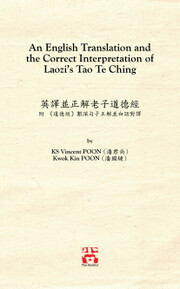Tao Te Ching
道德經
Background information
Tao Te Ching (《道德經》, or Dao De Jing), presumably written by Laozi (老子) of the 6th century BC, is one of the most famous and influential philosophical works in Chinese history. Written in fewer than 6000 Chinese characters, Tao Te Ching outlines the characteristics and roles of the fundamental Tao (道) and its Te (德, Manifestation of Tao) in the formation and maintenance of all in the Universe. Remarkably, it also depicts the underlying nature of governance and some natural laws, which, surprisingly, include modern scientific concepts such as atomic theory, chemical equilibrium, polarities, and the quantum uncertainty principle.
Unfortunately, Tao Te Ching is often misinterpreted by many for more than two thousand years. Their failures are mainly attributed to applying Taoist Religion (道教), Huang-Lao (黄老), and Confucian concepts in interpreting characters such as “鬼”, “神”, “仁”, “慈”, “善”, and “德”. Further, “若”, “似”, and “或” are also frequently misinterpreted, giving rise to the incorrect impression that Laozi was a scheming and calculating philosopher. Prominent interpreters of the past and present, including Heshang Gong (河上公), Wang Bi (王弼), Gao Heng (高亨), and James Legge, have all committed these types of errors in varying degrees.
This book provides readers with an annotated, line-by-line, concise, consistent, and correct English translation and interpretation of Tao Te Ching. Accompanied 674 footnotes include references and brief discussions on general misunderstandings. Further, to facilitate easy reading, the bare translated text is supplemented in a separate section, while the correct interpretation of difficult and complex sentences in vernacular Chinese (《道德經》艱深句子正解並白話對譯) in another. Accordingly, this book is perfect for anyone interested in Chinese philosophy.
Original Chinese Text
(Wang Bi's 王弼 Edition)
English Interpretation
by KS Vincent Poon (潘君尚) and Kwok Kin Poon (潘國鍵)
第十二章 Chapter 12
____
35. 五色令人目盲; 五音令人耳聾;
Feeding one’s eyes with all the five colours (五色, i.e., all the different colours) excessively will make one go blind; delivering one’s ears with all the five musical notes (五音, i.e., all types of music) immoderately will make one go deaf;
36. 五味令人口爽; 馳騁畋獵, 令人心發狂; 難得之貨, 令人行妨。
Providing one’s tongue with all the five flavours (五味, i.e., all the different tastes) exorbitantly will impair (爽) one’s sense of taste; riding horses (馳騁) and hunting (畋獵) obsessively will make one lose sanity (狂); rare and treasured valuables will motivate one to act (行) towards harming and taking advantage of others (妨).
37. 是以聖人為腹不為目。故去彼取此。
****
第十三章 Chapter 13
38. 寵辱若驚,貴大患若身。
39. 何謂寵辱若驚?寵(為上,辱)為下,得之若驚,失之若驚,是謂寵辱若驚。
40. 何謂貴大患若身?吾所以有大患者,為吾有身,及吾無身,吾有何患?
41. 故貴以身為天下,若可寄天下;愛以身為天下,若可託天下。
第十四章 Chapter 14
42. 視之不見,名曰夷;聽之不聞,名曰希;搏之不得,名曰微。
43. 此三者不可致詰,故混而為一。其上不皦,其下不昧。繩繩不可名,復歸於無物。
44. 是謂無狀之狀,無物之象,是謂惚恍。迎之不見其首,隨之不見其後。
45. 執古之道,以御今之有。能知古始,是謂道紀。
第十五章 Chapter 15
46. 古之善為士者,微妙玄通,深不可識。夫唯不可識,故強為之容。
47. 豫兮若冬涉川;猶兮若畏四鄰;儼兮其若容(客);渙兮若冰之將釋;敦兮其若樸;曠兮其若谷;混兮其若濁;
48. 孰能濁以靜之徐清?孰能安以久動之徐生?保此道者,不欲盈。夫唯不盈,故能蔽不新成。
第十六章 Chapter 16
49. 致虛極,守靜篤。萬物並作,吾以觀復。夫物芸芸,各復歸其根。
50. 歸根曰靜,是謂復命。復命曰常,知常曰明。不知常,妄作凶。
51. 知常容,容乃公,公乃王(周),王(周)乃天,天乃道,道乃久,沒身不殆。
第十七章 Chapter 17
52. 太上,下(不)知有之;其次,親而譽之;其次,畏之;其次,侮之。
53. 信不足焉,有不信焉。悠兮,其貴言。
54. 功成事遂,百姓皆謂我自然。
第十八章 Chapter 18
55. 大道廢, 有仁義; 慧智出, 有大偽;
56. 六親不和,有孝慈;國家昏亂,有忠臣。
第十九章 Chapter 19
57. 絕聖棄智,民利百倍;絕仁棄義,民復孝慈;絕巧棄利,盜賊無有。
58. 此三者以為文不足。故令有所屬:見素抱樸,少私寡欲。
第二十章 Chapter 20
59. 絕學無憂,唯之與阿,相去幾何?善之與惡,相去若何?人之所畏,不可不畏。
60. 荒兮其未央哉!衆人熙熙,如享太牢,如春登臺。我獨怕兮其未兆;如嬰兒之未孩;儽儽兮若無所歸。
61. 衆人皆有餘,而我獨若遺。我愚人之心也哉!沌沌兮,俗人昭昭,我獨若昏。俗人察察,我獨悶悶。
62. 澹兮其若海,飂兮若無止,衆人皆有以,而我獨頑似鄙。我獨異於人,而貴食母。
第二十一章 Chapter 21
63. 孔德之容,唯道是從。道之為物,唯恍唯惚。忽兮恍兮,其中有象;恍兮忽兮,其中有物。窈兮冥兮,其中有精;
64. 其精甚真,其中有信。自古及今,其名不去,以閱衆甫。
65. 吾何以知衆甫之狀哉?以此。
第二十二章 Chapter 22
66. 曲則全,枉則直,窪則盈,敝則新,少則得,多則惑。是以聖人抱一為天下式。
67. 不自見,故明;不自是,故彰;不自伐,故有功;不自矜,故長。
68. 夫唯不爭,故天下莫能與之爭。古之所謂曲則全者,豈虛言哉!誠全而歸之。
This is why the wise sages only seek to satisfy the bare necessity of their bellies (腹) and choose not to be enslaved by what can be seen (目). Hence, the wise sages leave behind the former mindset of indulgence and choose to take this latter mindset of frugality.
FOR FURTHER TRANSLATION, FOOTNOTES, AND ELABORATIONS
PLEASE SEE :

An English Translation and the Correct Interpretation of Laozi’s Tao Te Ching 英譯並正解老子道德經 附 《道德經》艱深句子正解並白話對譯
by KS Vincent POON and Kwok Kin POON (July. 2020)
ISBN 978-1-989485-15-6
Tao Te Ching (《道德經》, or Dao De Jing), presumably written by Laozi (老子) of the 6th century BC, is one of the most famous and influential philosophical works in Chinese history. Written in fewer than 6000 Chinese characters, Tao Te Ching outlines the characteristics and roles of the fundamental Tao (道) and its Te (德, Manifestation of Tao) in the formation and maintenance of all in the Universe. Remarkably, it also depicts the underlying nature of governance and some natural laws, which, surprisingly, include modern scientific concepts such as atomic theory, chemical equilibrium, polarities, and the quantum uncertainty principle.
Unfortunately, Tao Te Ching is often misinterpreted by many for more than two thousand years. Their failures are mainly attributed to applying Taoist Religion (道教), Huang-Lao (黄老), and Confucian concepts in interpreting characters such as “鬼”, “神”, “仁”, “慈”, “善”, and “德”. Further, “若”, “似”, and “或” are also frequently misinterpreted, giving rise to the incorrect impression that Laozi was a scheming and calculating philosopher. Prominent interpreters of the past and present, including Heshang Gong (河上公), Wang Bi (王弼), Gao Heng (高亨), and James Legge, have all committed these types of errors in varying degrees.
This book provides readers with an annotated, line-by-line, concise, consistent, and correct English translation and interpretation of Tao Te Ching. Accompanied 674 footnotes include references and brief discussions on general misunderstandings. Further, to facilitate easy reading, the bare translated text is supplemented in a separate section, while the correct interpretation of difficult and complex sentences in vernacular Chinese (《道德經》艱深句子正解並白話對譯) in another. Accordingly, this book is perfect for anyone interested in Chinese philosophy.
WorldCat/Library: [WorldCat] [U of Oxford] [U of Cambridge] [Harvard U] [Kyoto U] [National Taiwan U] [HKU] [CUHK]etc...
Jump to: Taoism
Jump to: Works in Standard Script